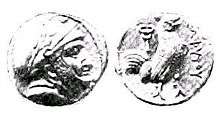Kandahar Sophytos Inscription


The Kandahar Sophytos Inscription is a inscription in Greek made by Sophytos, son of Naratos, in the 2nd century BCE, in the city of Kandahar. The inscription is written on a square limestone plaque, which was probably part of a wall.[1] The inscription, although bought on a market, is though to have come from Old Kandahar, the supposed ancient Alexandria in Arachosia.[2]
The text is written in a very high level Greek language, displaying a real refinement of Greek culture so far east in Kandahar.[2] The verses are in the sophisticated acrostich form.[2]

Sophytos and Naratos are not Greek names.[2] They may have been Indian, their actual names being possibly Subhūti and Nārada.[2] The name "Sophytos" is also know from a 4th-3rd century Greek coins of the Arachosian satrap Sophytos, who is otherwise unknown.[2][3] There is a possibility that the Sophytos of the inscription may have been a descendant of the eponymous Satrap Sophytos.[3]
According to the inscription, Sophytos was ruined in early life, but later rebuilt his fortune through fortitude. Some authors consider that his ruin may be due to the invasion of Arachosia by the Greco-Bactrians in the 2nd century BCE, supposing that Sophytos had been a Hellenized Indian in the service of the Arachosians region of the Maurya Empire.[3] The usage of Greek and Aramaic is attested in the area from the 3rd century BCE due to the Kandahar Bilingual Rock Inscription of Emperor Ashoka.[3][2]
The inscription highlight the facts that some Indians lived in the "Greek" city of Alexandria Arachosia, and had reached a very high level of Greek culture (only one mistake in prosody has been identified in the whole text).[3]
Greek translitaration
English translation
Stele of Sophytos
- For a long time the house of my ancestors had been thriving
- when the unbeatable violence of the triple Fates destroyed it.
- But I, Sophytos of the stock of Naratos, all together so small
- and pitiably bereft of the support of my parents,
- practiced the excellence of the Muses and The Shooter
- mixed with noble prudence
- and devised a way to build up my ancestral home again:
- with fruit-bearing money taken from elsewhere,
- I went away from home determined not to come back
- until I acquired the greatest abundance of good things.
- For this reason I went on merchant ships into many a city
- and acquired sound and far-reaching wealth.
- Surrounded by praise, I came back to my homeland after innumerable years,
- and a delight I proved to be to my well-wishers.
- And both the paternal house that was rotten
- I made at once stronger out of new means
- and, with the tomb having fallen to the ground, I built another one;
- and while still alive I set up by the road this telling stele.
- Would that my sons and grandchildren keep this house of mine so,
- for I have accomplished these enviable deeds![4]
References
- ↑ Brill Online Reference Works
- 1 2 3 4 5 6 7 The Muse at Play: Riddles and Wordplay in Greek and Latin Poetry, Jan Kwapisz, David Petrain, Mikolaj Szymanski, Walter de Gruyter, 2013, p.284-287
- 1 2 3 4 5 Histoires grecques, Maurice Sartre, Le Seuil
- ↑ A. Chaniotis, T. Corsten, R.S. Stroud, R.A. Tybout (ed.), Supplementum Epigraphicum Graecum, Volume LIV (2004). Leiden/Boston: Brill, 2008. Pp. xxxiii, 916. ISBN 9789004166875